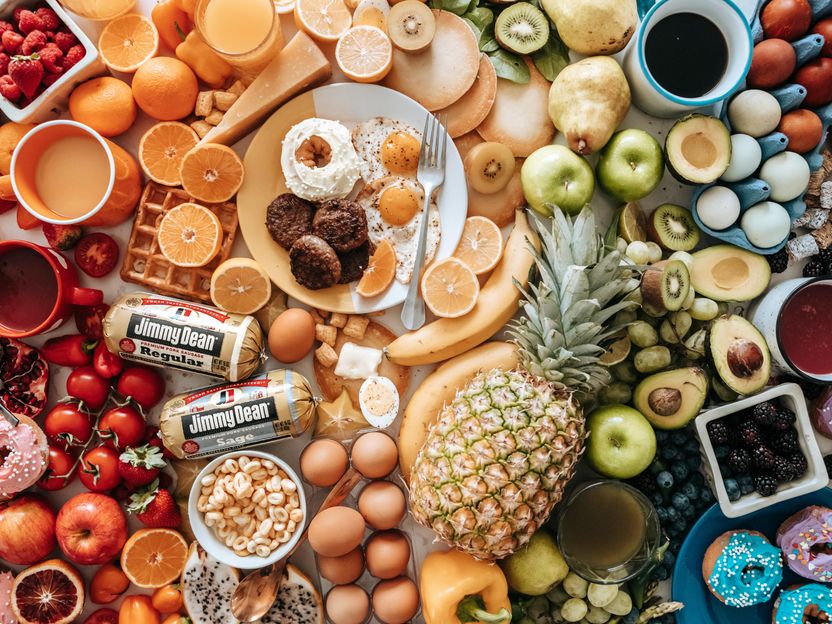Pandemic changes the food retail trade
Germans want to eat healthier and more sustainably, shop more online and save more at the same time
Advertisement
The Corona pandemic brought German food retailers sales increases of 12.6% last year, but also presented them with major challenges. The stricter the lockdown regulations became, the more consumers adjusted their shopping behavior and want to maintain new behaviors. Compared to 2020, 41% of respondents in Germany want to pay more attention to healthy food, compared to the European average of only 34%. 33% of Germans want to save more when buying food compared to last year, which is below the European average of 37%. 25% of German consumers want to do both: shop healthier, regionally or more sustainably and save money at the same time. These are the key findings of the report "Disruption and Uncertainty - State of Grocery Retail 2021" by McKinsey & Company and EuroCommerce. For the Europe-wide study, the consultancy and the association surveyed 10,000 consumers in ten countries (Germany, Switzerland, the UK, Spain, France, Italy, the Netherlands, Poland, Russia and Sweden) as well as 48 CEOs of the European food retail industry in January. The study sheds light on the development of the industry in the pandemic year 2020 and analyses what long-term consequences changing consumer behaviour will have on the future of food retailing.

Photo by Jimmy Dean on Unsplash
Key themes of the survey: How will consumers buy their groceries in the coming years? What are they willing to spend money on? What channels will they use? "We see a new level of disruption in both the rapid changes in consumer behavior and the industry's response to them. And we have no reason to believe that this will cool down in the near future," says Tobias Wachinger, senior partner at McKinsey & Company. According to the study, four major trends are emerging that will have a significant impact on food retailing in the coming years: greater awareness of lifestyle and price, the continued triumph of online shopping, and the foreseeable opening of food service operations.
Healthy, regional, sustainable: lifestyle influences food selection
Different consumer groups are making more and more varied demands on the quality of their food, which retailers are expected to meet. With little else to spend money on due to the pandemic, consumers are spoiling themselves with food and are less willing to compromise. In 2021, 58% of consumers surveyed say they want to adapt their food purchases to their lifestyle more than in 2020. 41% want to pay more attention to healthy eating, for example avoiding certain additives. 34% want to pay attention to regional origin, 28% to the sustainability of products. The additional challenge here from the retailers' point of view: 25% of consumers also want to save money at the same time.
Price is the deciding factor (again)
In the pandemic, Germans continue to spend significantly more money on private food purchases due to closed restaurants and canteens. The price therefore hardly played a role in this segment in 2020, despite the economic crisis. However, this will change again this year. 59% of Germans say they choose their supermarket according to the best price-performance ratio, 33% of those surveyed want to look for ways to save money when buying food. Price is also high on the agenda of decision-makers, with 76% of CEOs surveyed saying that greater consumer price sensitivity will be one of the key trends over the next one to two years.
Online is becoming commonplace
The pandemic has dramatically accelerated the trend toward online shopping, even for groceries, and this momentum will continue. Therefore, without continuing to grow its own online channel, it will become increasingly difficult to increase market share. In 2020, online has grown by 55% in Europe, but only 40% in Germany, so there is catch-up potential. Grocery retailers will have to adapt to not only ensure fast delivery times for their customers, but also increase product variety and offer low-cost options. One in two European consumers who used online channels during the pandemic intend to continue doing so in the future.
Opening up the catering industry
Although it will be a while before restaurant visits return to pre-crisis levels, a sharp increase is expected once lockdown restrictions are lifted. This will be felt by food retailers. Although 16% of consumers say they will continue to cook at home more after the pandemic, 10% say they will actually eat out more after the pandemic than before. As a result, just under half of the European decision-makers surveyed expect the market situation for their industry to worsen in 2021 compared to 2020.
Christian Verschueren, Director-General at EuroCommerce: "Our industry has been hit hard by the pandemic in the non-food and food wholesale sector. And while COVID has driven demand from restaurants and hotels closed in the lockdown into grocery retailers, increasing retail sales, it has also increased costs to ensure the safety of customers and employees, as well as through logistical challenges. Retailers have also invested heavily in expanding e-commerce due to the sudden increase in demand. It will take a while for this to be profitable."
Overall, these developments are leading to increased pressure on margins for food retailers. At the same time, they must adapt to increasingly diverse consumer demands, greater pricing pressure and multi-channel complexity, as well as the growth of the online channel, which has so far been a negative business. "The speed and magnitude of these changes will completely reshuffle the cards in grocery retailing, unearthing new winners and losers. Those retailers that boldly step ahead to address the big trends have a great opportunity to gain market share," says Daniel Läubli, McKinsey partner and co-author of the study.
Note: This article has been translated using a computer system without human intervention. LUMITOS offers these automatic translations to present a wider range of current news. Since this article has been translated with automatic translation, it is possible that it contains errors in vocabulary, syntax or grammar. The original article in German can be found here.



































































